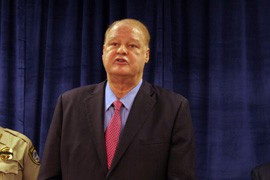Cronkite News has moved to a new home at cronkitenews.azpbs.org. Use this site to search archives from 2011 to May 2015. You can search the new site for current stories.
Arizona leaning toward joining $25 billion foreclosure settlement
WASHINGTON – Arizona is one of a handful of states that have not yet agreed to a potential $25 billion mortgage settlement for suffering homeowners, but the state hopes to join soon, officials said.
State Attorney General Tom Horne was still weighing the terms of the settlement Tuesday, according to his office, but is leaning toward joining more than 40 states that had signed on to the deal by Monday.
The settlement, between state attorneys general and the nation’s five largest mortgage lenders, could be worth as much as $25 billion from the banks if all 50 states sign on.
Aimed at addressing abusive foreclosure practices, the settlement would reduce loans for homeowners who are “under water” – or owe more than their home is worth. Some advocates have said they expect an average payment of about $20,000 per homeowner, but others say it is too early to predict an amount.
Lenders would also send checks of about $2,000 under the deal to hundreds of thousands who lost homes to foreclosure.
Arizona needs to resolve a separate lawsuit against Bank of America before it can formally join the settlement, said Horne spokeswoman Amy Rezzonico. But the state hopes to join and expects to have an official announcement within the next couple of days, she said in an email.
More than 40 states had agreed to the settlement by a Monday night deadline, said Iowa Attorney General Tom Miller, who has been leading negotiations for the states. Even though they missed Monday’s deadline, Arizona and other holdouts will still have a chance to join as final details are negotiated, Miller spokesman Geoff Greenwood said.
“Federal and state officials, as well as representatives from the banks, continue to address matters that they must complete before finalizing any settlement,” Miller said in a prepared statement.
Consumer advocates expressed mixed feelings, saying it’s good to have some settlement but questioning whether it does enough to address widespread foreclosure abuses.
“It is far from addressing the scope of the (foreclosure) crisis,” said George Goehl, executive director of National People’s Action, a network of community advocacy groups. “It’s a very small first step in addressing the foreclosure crisis and the need to write down underwater mortgages.”
About 11 million homes nationwide are under water, for a total of $758 billion, Goehl said. He called the settlement “a small drop in a very large bucket,” and said it will only help homeowners who are underwater by a certain amount – not those who are drowning.
The deal with Bank of America, JPMorgan Chase, Wells Fargo, Citigroup and Ally Financial comes almost 16 months after states began investigating suspect foreclosure practices. It specifically addresses a practice called “robo-signing,” in which mortgage paperwork may have been fraudulently signed without regard to documentation to speed up the foreclosure process.
Wells Fargo officials on Tuesday declined comment on the deal.
Arizona was one of the states hardest hit by the housing crisis that began in 2008, and would likely benefit more than most from the settlement.
“For some states it’s a good deal, for some states it’s not a good deal,” said Ira Rheingold, executive director of the National Association of Consumer Advocates. “The questions states are asking is, ‘If we don’t sign on, are we going to get better elsewhere?’”
Attorneys general for New York, California and Delaware were among the others holding out on the settlement Tuesday.
The agreement would be the most-costly multistate industry settlement since 1998, when 46 states brokered a deal with the tobacco industry for more than $200 billion.
Rheingold said a major concern is making sure the deal is properly enforced. He noted it would likely take years for all the money to be disbursed to homeowners.
“It’s a step in the right direction, and it doesn’t stop states from doing other things to hold banks accountable,” Rheingold said.
The deal must be approved by a federal judge and will not prevent homeowners from pursuing further legal action, Rheingold said.







